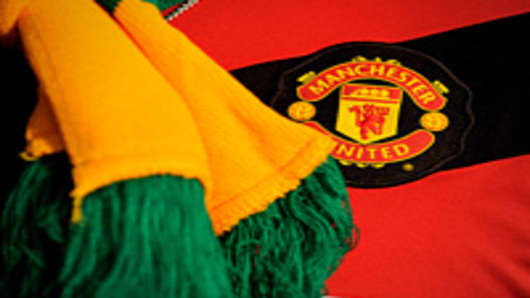I noted on CNBC that Manchester United, which priced 16.6 million shares at $14 in its IPO Friday, is making it all worthwhile for the high-frequency crowd today.
Why? Because, for the moment, it's a money-trading machine.
At 1pm ET, Manchester United has traded north of 25 million shares. Wait a minute: they priced 16.6 million — it's traded 150 percent of the float in 3.5 hours! (Poll: Is Man United IPO a Good Investment?)
That's because there is a syndicate bid at $14 that is holding up very effectively. A syndicate bid is just what it sounds like: the underwriters do not want the stock to drop below the initial price of $14 on the first day of trading. It's embarrassing: it implies they mispriced the deal.
So they put in bids at the initial price. Every time it goes to $14, there are bids. How many? Well, enough to support it at $14 minimum. Knowing this, high frequency traders come in, buy at $14 or $14.01 confident it is unlikely to drop below $14, and then sell at $14.01 or $14.02.
Instant money!
And it gets even better: they collect a rebate as well.
This is one of the weird features of modern stock trading. Stock exchanges offer "rebates" to trade on their platforms. It's crazy — it's paying for order flow — but everyone does it.
This essentially offers additional profits to traders and, in the case of Manchester United, additional protection.
Here's how it works. If a trader — high frequency or other — hits a bid at $14.00, they can get rebates of up to 0.3 cents per share (the exact amount varies depending on the exchange and what type of trader you are). If they sell at the offer, whatever the price is, they can also get 0.3 cents per share.
So they could make 0.6 cents on the trade just off the rebate, regardless of whether they make money by buying at $14 and selling at, say, $14.01.
The key: to get the rebate on both sides, you have to buy on the bid and sell on the offer.
So how long will the syndicate support the $14 bid? We have no idea: they are not putting out a press release. It's certainly refreshing that they are supporting it, but how deep their pockets are is not at all clear.
One thing is for sure: you have an IPO that is essentially trading in a 5 cent range all day ($14.00-$14.05). That is a little strange. Once the syndicate bid is gone, it is likely to be far more volatile.
_____________________________
More on Markets & Sports Biz:
- What's an Olympic Medal Cost?
- London Olympics an ‘Economic Failure’: Roubini
- Richard Branson's Sports Lessons
_____________________________
Want updates whenever a Trader Talk blog is filed? Follow me on Twitter: twitter.com/BobPisani.
Questions? Comments? tradertalk@cnbc.com



